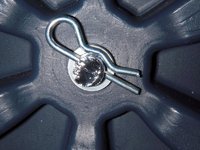 |
| Angelika/Mike Schilli |
|
Michael I'm sure I've mentioned this before: when German children learn to speak English in school, their newly aquired skills are of little practical value when they go abroad and try to use them. They're taught how to get the grammar right, including present perfect and past tense, but when they try to communicate with regular people in the U.S., they need to start relearn everything all over again. A large part of the vocabulary in everyday use is never taught in German schools. Take home improvement, for example. I'm pretty sure that someone with a German high school degree could not even come up with the words for half the items sold at Home Depot.
They've never heard the words "pliers", "drill", "door handle", "door hinge", "sand paper", or "Phillips screw driver". The word for the adjustable wrench in figure 1 is also widely unknown. There are tools available in Germany that are similar to what's called a "monkey wrench" in the U.S., their literal translation is "Englishman" (wrench open on one side) and "Frenchman" (open on both sides).
This reminds me that a TSA employee at the X-Ray machine at the airport once asked me if I had a ranch. I didn't quite get the connection between my backpack and raising cattle, and looked at him quite puzzled. It turned out that I had left an adjustable wrench for bicycle repairs in one of my backpack's many pockets, and bringing mechanical tools apparently wasn't permitted this week. The employee had spoken with a South American accent and meant to say "wrench", not "ranch", how funny!
And there's mechanical parts with names that I honestly have never heard in all of the sixteen years I've been living in the U.S.. Recently, I asked a colleague at work if it was okay that the wheels of my beach mobile Rundbrief 08/2012 were mounted onto the axle and held in place only by thin pins (Figure 2), if that wasn't shoddy craftsmanship, or "Pfusch" in German?
It turned out that if something doesn't fall apart right away in the U.S., it's "good enough" and noone spends another thought on it. But, so I went on, wouldn't it be better to use some kind of quick release instead of the flimsy pins? Sure, it would be more expensive, but so much sturdier, and also much easier to take apart and put back together! He admitted that there's no equally catchy word for "Pfusch" in English. But he said that there's a word for design that's more complicated than needed, and that's "dumb". Apparently, my colleage is a comedian!
And then I needed to know the name of this curly wire: It's called a "cotter pin". Apparently, a cotter is not only someone living on someone's premises in exchange for garden and houshold work, but also denotes a metal wedge or pin. I had never even once heard of that word before!
Back to the list of the handyman tools mentioned at the beginning of this topic: "Phillips head" is American for a cross-type slotted screw driver. It's named after its inventor, businessman Henry F. Phillips, which spells with two Ls, as opposed to "Philips", which is a Dutch electronics company. I bet you did not know that!












